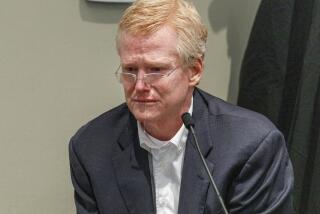Guilty Verdict Cannot Dissolve the Pain
- Share via
In retrospect, the jury’s verdict that Timothy McVeigh is guilty on each of the 11 counts against him seems the only possible result.
Though largely circumstantial, the evidence that the 29-year-old was responsible for the 1995 bombing of the Alfred P. Murrah Federal Building in Oklahoma City was overwhelming. That blast, which killed 168 people and injured more than 500 others, was the deadliest act of terrorism ever on U.S. soil. Witnesses for the prosecution, perhaps most poignantly McVeigh’s sister, Jennifer, gave compelling testimony that he had the motive, the opportunity and the means for committing this heinous act.
Rightly, the judge was determined that this trial not become a public spectacle or an endurance contest for the jurors or the bombing survivors and the families. U.S. District Judge Richard P. Matsch pushed prosecutors and defense attorneys to present streamlined and coherent cases--and both teams did that during the two-month trial.
But few cases are open and shut, and the federal government’s case against McVeigh was no exception. Our jury system, properly, hands to ordinary men and women the burden of sifting the evidence and determining whether there is guilt beyond a reasonable doubt. This responsibility weighed heavily on the seven men and five women assembled in the Denver court building. They engaged in no rush to judgment, deliberating almost 24 hours from Friday to Monday before announcing they had reached a verdict. As the weekend passed without a verdict, survivors and the families had worried that the jury was deadlocked or might even acquit McVeigh on some or all counts.
Now, with a guilty verdict entered, the federal case moves to the penalty phase. Following a mini-trial on that issue, the same jury will be asked to determine whether McVeigh should be executed or sentenced to life in prison.
A second defendant, Terry L. Nichols, who served with McVeigh in the Army, will be tried later on federal murder and conspiracy charges. McVeigh also faces trial in Oklahoma on state charges of murder in the deaths of the 168 people in the truck bombing.
McVeigh was deeply engaged in conspiracy politics and he raged at the federal government, in part because of its assault on the Branch Davidian compound at Waco, Texas. Nothing, of course, can justify the murderous violence he inflicted on the innocent in Oklahoma City.
The families of those killed by the defendant, visible and dignified spectators throughout these proceedings, hoped that a guilty verdict would offer a small measure of consolation and closure. Perhaps it has. But it cannot be enough.
More to Read
Sign up for Essential California
The most important California stories and recommendations in your inbox every morning.
You may occasionally receive promotional content from the Los Angeles Times.










